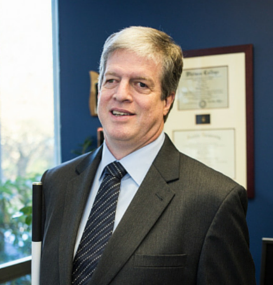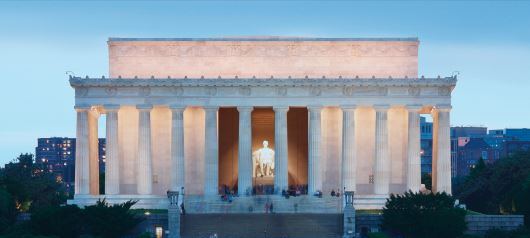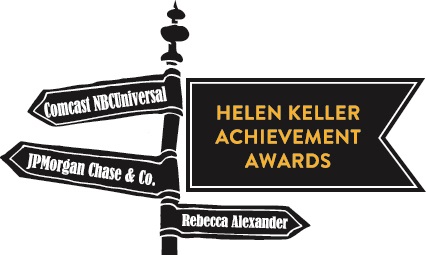Breaking News: Kirk Adams, Prominent on the National Stage, to Lead AFB
After an exhaustive nationwide search, the American Foundation for the Blind announced the appointment of a new leader, Kirk Adams, who will take office in May. Prominent on the national stage, Kirk Adams is currently the President and CEO of The Lighthouse for the Blind, Inc., where he is known for innovative and effective leadership.
The appointment was made in the wake of Carl R. Augusto’s decision to retire after 25 years of outstanding service to AFB. We congratulate Kirk as he becomes only the sixth leader to head AFB since its founding in 1921.
Grandparenting with Vision Loss: a Great Adventure
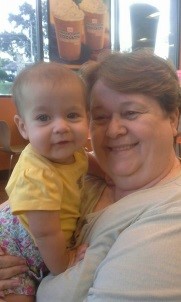
Linda Fugate, Ed.D., is a vision rehabilitation therapist who is an avid supporter of AFB and its award-winning programs.
“I always recommend AFB resources to my clients. It is one of the best ways for them to find information about vision loss and life with vision loss,” she said. “AFB.org is a positively focused website that offers them concrete information and hope. They can ask questions and receive answers that will guide them.”
Linda offers guidance through her blog posts on AFB’s VisionAware website. She is not letting a little age-related vision loss prevent her from being an active and engaged grandma. In her own words, the adventure continues:
Parenthood was one of the greatest adventures of my life. It was filled with highs and lows, many firsts, from sleeping through the night to walking down the aisle at a wedding. For my children, there was also Grandma and wonderful memories of time spent together. So, for me, being a grandparent meant sharing adventures, stories, tea, and ballgames.
But how do you play catch or read stories when the world is a blur? How do you pass on your passion, whether that is knitting or gardening, camping or music, when you cannot see? These are questions I had to deal with as a grandparent.
Some things I learned I have had to leave to others; however, I have been able to have wonderful relationships with all my grandchildren, and have passed on to them the things I value in life.
Traditions like story time and “reading the pictures.” We just sit down with a book and my grandchild tells the story based on the pictures in it. This is especially fun when it is a new book and the ending is unknown.
When Jacob was young, he loved oatmeal cookies at my house. One day, he asked if we could make them. This meant a trip to the store, two buses, shopping for ingredients and a cab ride home. Later, Jacob told his mother that the whole experience was as much fun as Disney World!
The kitchen is a wonderful place with grandchildren. I have found some of the things I need because of my vision actually works well with children. I use large-print recipes which turn out to be easier for young children to follow. My measuring cups are marked with large numbers in a contrasting color and the marks on my stove are great for little fingers. One thing I learned was to try the recipe at least once before including a grandchild. This prevented a few culinary mishaps!
AFB Tips for Grandparents with Vision Loss:
1) Continue to play an active role in your grandchildren’s lives
2) Attend athletic events and recitals, even if you cannot see
3) Modify games and activities so you and they can both participate
4) Be open and direct about your limitations “I cannot play catch with you but I can tell you a story.”
Read more stories about learning to live with vision loss at AFB’s VisionAware.
Aaron Preece: Making Our World Universally Accessible
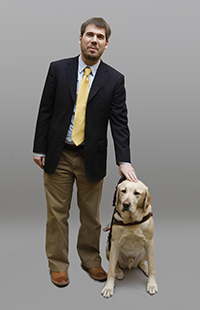
Before he was ever hired at AFB, National Technology Associate Aaron Preece was featured in a light-hearted AFB CareerConnect video called “Dress and Impress,” demonstrating the do’s and don’ts of the job interview for young people with vision loss.
“As a boy, I met AFB’s President & CEO Carl Augusto and Vice President of Programs Paul Schroeder when they visited Huntington, West Virginia — the fact that they were both accomplished professionals who are blind, left an impression on me,” he said.
Aaron lost his vision in childhood due to Leber’s, a retinal disease, but attended regular public school in Huntington where he still lives. In school, he relied on a laptop computer, screen reader, and sometimes a special “Thermoform” printer that produced textured diagrams. He played trumpet in the school band and piano.
“I had really great teachers who would treat me like everyone else,” he said.
Aaron was also an active boy scout and enjoyed hiking. The scout masters would sometimes modify their instructions so that he could follow, such as demonstrating how to tie knots through touch rather than sight.
Aaron studied history at Marshall University while working as an intern at AFB. But it was his hands-on skills with technology and not his familiarity with the Thirty Years’ War that led to his current role.
“At AFB Tech in Huntington, I help test new products and look at websites and apps to see how accessible they are,” he said.
In his free time, he enjoys playing the guitar and taking long walks with his guide dog Joel.
“I used to get around with a cane but having a guide dog is a much faster more efficient way to travel,” he said.
Through his work at AFB, Aaron is making our world more accessible.
Inspired to Support AFB: UK Artist Bruce Church
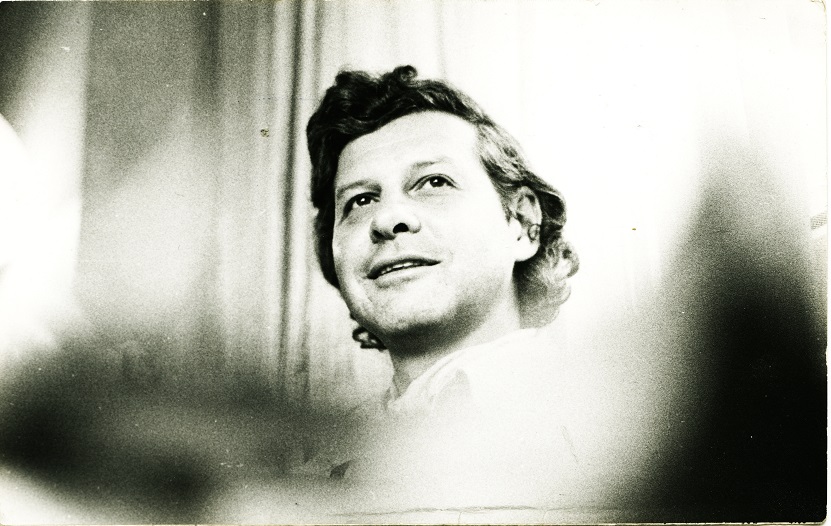 |
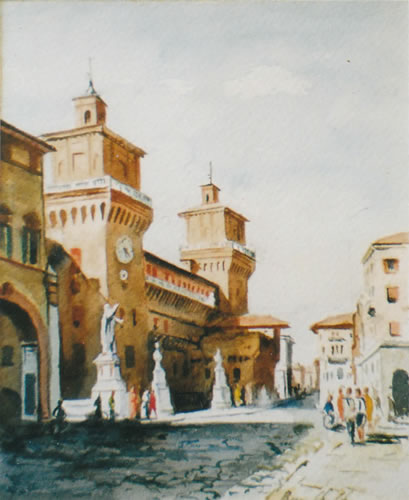 |
Bruce Church has lived in London for more than 40 years. The New York-born painter has been an active AFB donor since 1980, both because of AFB’s historic importance in preserving Helen Keller’s legacy and for offering innovative programs that help children and adults with vision loss. “As a visual artist, I find it nearly impossible to imagine life without sight, but AFB works to remove barriers and prejudices so that people with vision loss have the tools and opportunities they need to flourish,” he said.
Bruce graduated from Columbia University with a degree in visual art and pursued painting in France and England as well as studying with the eminent Austrian expressionist Oskar Kokoshka. Bruce’s murals can be found in New York, London, France, Portugal and Hong Kong and some of his works have been reproduced in influential art books.
The article “Three Days to See” by Helen Keller was one of the most inspiring things he has ever read, according to Church. First printed by The Atlantic in 1933 and still promoted on AFB’s website, the article provides a detailed musing of the many things Keller would wish to observe and explore if she were given the gift of sight for three days.
“I see the world in very visual terms, so AFB is an organization that resonates very strongly with me. There are many other worthy causes out there but this is one that remains closest to my heart,” he said.
Make Summer Plans Now
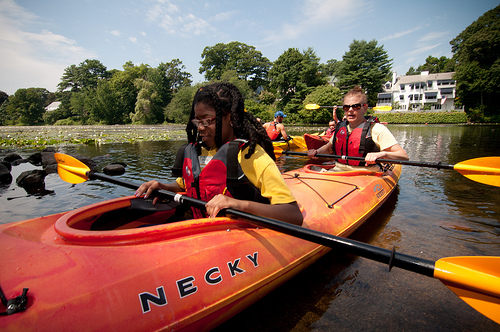
If you or someone you know has a child with vision loss, it is not too early to start making plans for summer camp. Finding engaging and appropriate activities during school holidays can be especially difficult for families of children with vision loss. That’s why AFB’s FamilyConnect website has created a special directory for recreational activities.
Visit FamilyConnect’s list of Summer/Day Camps and After-school Programs to find out about sleep-away camps or day programs. AFB connects children and youth to enjoyable activities such as swimming, bowling, dance, and arts and crafts as well as essential learning activities related to the expanded core curriculum.
FamilyConnect also offers important tips and recommendations, such as how to find financial aid if summer camp is unaffordable.
For children with vision loss, going away to sleep-away camp or attending a day camp can have a valuable, long-term impact on their growth and development. For more information, visit FamilyConnect’s summer camp page.
Building a Future of Possibilities: AFB 2016 Leadership Conference in Washington D.C. (March 3-5)
The American Foundation for the Blind's annual Leadership Conference covers the most pressing and important topics in the field of blindness and offers opportunities to learn from the best and brightest, to make new connections, and reunite with old friends while earning continuing education credits.
Conference attendees include technology experts, corporate representatives, university professors, teachers of students with visual impairments, orientation and mobility instructors, rehabilitation professionals, and parents. They come from diverse organizations and institutions spanning the public and private sectors, including school districts, schools for the blind, Veterans Administrations, hospitals, private agencies, and universities.
Last year’s conference attracted over 400 attendees from 39 states and 8 countries and this year promises to be just as well attended. For registration, exhibit, and sponsorship information, visit: www.afb.org/afblc.
20th Annual Helen Keller Achievement Awards, New York City
Join us for an exciting evening of glamour and fun that helps a good cause! The 20th Annual Helen Keller Achievement Awards will be held on Thursday, June 16, 2016, at the J.W. Marriott Essex House in New York City. This year, we will celebrate Comcast NBCUniversal and JPMorgan Chase & Co. for their efforts to make their products and services more accessible to people with vision loss. We will also honor inspirational author/psychotherapist Rebecca Alexander, LCSW-R, MPH, who is losing her vision and hearing due to Usher syndrome type III. Don’t miss it! For tickets and information, visit: www.afb.org/hkaa.
If you found this information helpful, please consider supporting our work. Donate.
